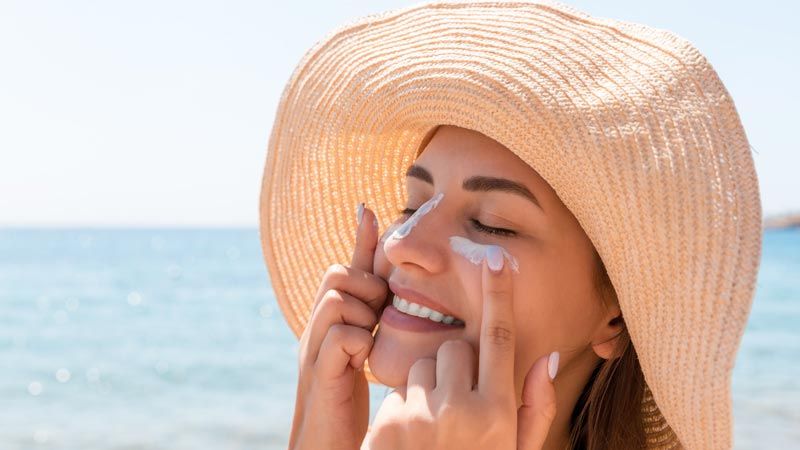How To Protect Your Skin In Summer?
- 23 months ago
Summer is here! But before you hit the beach or pool, it's important to remember to protect your skin from the harmful rays of the sun. While we all love a good tan, it's not worth putting our skin at risk for sunburn or skin cancer.
Summer is a time for fun and outdoor activities, but it's also a time when your skin is more vulnerable to damage from the sun's harmful rays. Whether you are at the beach, having a picnic in the park, or simply running errands, it's essential to protect your skin from the sun's harmful ultraviolet (UV) rays.
How Does Summer Affect Your Skin?
As the summer season arrives and the humidity level increases, your skin's sebaceous glands become more active and secrete excess sebum, a natural oil. This sebum can accumulate on your skin's surface, leading to stickiness, grease, and blocked pores, which are often responsible for acne breakouts. People with oily skin are more susceptible to this problem because bacteria and oils mix with sweat and can exacerbate clogged pores and acne.
Moreover, when your skin is exposed to harmful UV rays, it triggers the production of melanin, a pigment that provides photoprotection. Excessive melanin production can lead to darker, tanned skin, but it can also cause issues such as itchy skin, prickly heat, sunburn, and rash due to sensitivity to the sun.

Ways to protect your skin in Summer
1) Wash your face to get rid of excess oil
During summer, oily skin tends to produce even more oil. It's important to use a suitable face wash that can effectively cleanse and remove dirt and grime from your skin. If you have dry skin, use a non-foaming cleanser that is mild, alcohol-free, and pH balanced. For those with oily skin, a deep cleansing face wash can help control excess oil and leave your skin feeling refreshed.
2) Wear sunscreen
One of the most essential steps in protecting your skin in the summer is to wear sunscreen. Look for a broad-spectrum sunscreen with an SPF of at least 30, and apply it to all exposed skin, including your face, neck, arms, and legs. Reapply sunscreen every two hours or more frequently if swimming or sweating.
[Related: Why shouldn't you step out without sunscreen in summers?]
3) Keep Your Skin Hydrated
It's essential to stay hydrated, especially in summer. To keep your skin hydrated, you can incorporate a hydrating face mask into your nighttime skincare routine. Another way to refresh your skin is to splash it frequently with water or carry a facial mist with you for a quick spritz throughout the day.
4) Use A Good Toner
A great toner may help in closing up open pores. Sebaceous glands are most dense in the T-zone of the face. To keep sweat and oil from clogging these pores, use a milder toner like aloe vera or cucumber.
5) Include Antioxidants In Your Skin Care Regime
Antioxidant serums are fantastic for hydrating your skin. Also, they protect your skin from environmental harm, help collagen production, and scavenge free radicals to prevent skin damage. Alternatively, you can incorporate it into your diet by eating citrus fruits, green leafy vegetables, green tea, etc.
6) Drink More Water & Fruit Juices
To stay adequately hydrated during the summer season, it is recommended that you consume at least 2-3 liters of water daily. You may also incorporate coconut water, watermelons, and fresh juices into your diet as they serve as excellent sources of hydration.
[Also check: Summer Is Back: It's Time To Eat Right For Glowing Skin]
7) Moisturize Well
A moisturizer is essential for summer skin protection. Based on your skin type, you can select a non-greasy formula. Search for antioxidants like vitamins A and C. If it has SPF, that's even better. It is best to apply moisturizer immediately after your bath.
8) Avoid Heavy Makeup
To ensure your skin can breathe properly, it's best to avoid heavy makeup like foundation that can block the pores. Factors such as humidity and heat can also hinder the skin's ability to breathe. Instead, consider using a tinted lip balm and a moisturizer with a touch of color to give your skin a natural glow while allowing it to breathe freely. This way, you can still wear makeup without sacrificing your skin's health.
In a nutshell
Protecting your skin during the summer months is crucial for maintaining healthy skin and reducing the risk of skin damage and disease. To protect your skin, use sunscreen with an appropriate SPF, seek shade during peak sun hours, and hydrate regularly.
By taking these steps and being consistent with your skincare routine, you can enjoy the summer sun without putting your skin at risk. Remember that prevention is key when it comes to skin health, so don't wait until you have a problem to start taking care of your skin.









